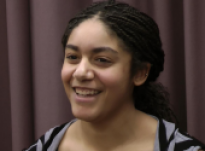Jazmin

Jazmin has systemic onset juvenile idiopathic arthritis. She was diagnosed when she was eighteen-months old. Most of her joints are painful and achy. She is not taking any medication and has an optimistic outlook on life.
Jazmin is a full-time university student. She is white and black Caribbean.
More about me...
Jazmin volunteered for CCAA. She learned lots by listening to talks by healthcare professionals and made friends with other members and volunteers with arthritis.
Jazmin volunteered for CCAA. She learned lots by listening to talks by healthcare professionals and made friends with other members and volunteers with arthritis.
Jazmin has arthritis in her wrist and cannot move it as much as she used to. X-rays show that her bones are deformed.
Jazmin has arthritis in her wrist and cannot move it as much as she used to. X-rays show that her bones are deformed.
My knees, ankles, toes, fingers, elbows, wrists, hips but the one where my arthritis is more like prevalent is in my wrist, in my right hand wrist. Like I have actually 75% usage of this wrist. That's because obviously the medicine and everything, they couldn't get to, you know, couldn't stop the arthritis attacking it so I've, yeah. If you ever say my x-ray you can actually see the bones are deformed compared to the left hand ones but yeah so I have limited usage of it and mainly my ankles it affects as well. So it's like in most of my joints but in more areas it like has more of a presence like say. Yeah so it's my wrists, mainly fingers and my ankles hurt more prior to being inflamed but it hasn't happened for a long time now really.
Jazmin developed a phobia of tablets after being repeatedly sick taking methotrexate. She tried different ways of taking the tablet like crushing it up in yogurts but it only helped a little.
Jazmin developed a phobia of tablets after being repeatedly sick taking methotrexate. She tried different ways of taking the tablet like crushing it up in yogurts but it only helped a little.
Jazmin's joint injections tickled her. They reduced the pain in her wrist so she could write in her exams.
Jazmin's joint injections tickled her. They reduced the pain in her wrist so she could write in her exams.
Jazmin found that her doctor spoke more to her than her mum when she moved from paediatrics to adolescent clinic. She said it was 'scary' at first to go to hospital by herself but she soon relaxed when she got in.
Jazmin found that her doctor spoke more to her than her mum when she moved from paediatrics to adolescent clinic. She said it was 'scary' at first to go to hospital by herself but she soon relaxed when she got in.
Jazmin's exercises targeted the areas that she struggled with most. When she did them at home her family joined in, and when she did them during PE her school friends did them too.
Jazmin's exercises targeted the areas that she struggled with most. When she did them at home her family joined in, and when she did them during PE her school friends did them too.
Jazmin sometimes got 'horrendous looks' and comments when she parked in a disabled parking bay. Her mum used to get angry and shout out to people.
Jazmin sometimes got 'horrendous looks' and comments when she parked in a disabled parking bay. Her mum used to get angry and shout out to people.
Jazmin's parents encourage her to be optimistic about the future and not see her arthritis as all 'doom and gloom.'
Jazmin's parents encourage her to be optimistic about the future and not see her arthritis as all 'doom and gloom.'
Jazmin has a positive attitude to life and feels there are worse things than having arthritis.
Jazmin has a positive attitude to life and feels there are worse things than having arthritis.
Sometimes people hide how much pain they are really in. Try asking them how they are feeling more than once.
Sometimes people hide how much pain they are really in. Try asking them how they are feeling more than once.
Try to seek out other people who have arthritis. They can understand how you are feeling and can offer support.
Try to seek out other people who have arthritis. They can understand how you are feeling and can offer support.
If you have been diagnosed try and seek other people out that have it as well because it's always nice to have a little bit of support from other sufferers and you know; I don't know how you would go about that but try and find like meetings or something that you know have other families that go to them or something. Even, I don't know, if you made, somehow approached the consultant and asked is there other kids in the clinic that might want to think about meeting up and having a chat or something like that. Just you know build some form of social network I suppose with that. Where like, the CCAA charity weekend, the one I go to, that's how I met my friends with arthritis and they're wonderful, they're normal people and you know they're great people to talk to if something was just like a bad day and everything, great to talk to because they know what's going on. You know they know what you're feeling and everything and you know you're not alone, you know. There's one in one thousand people in the country that'll get it so you know, there’s bound to be someone near you and everything.

